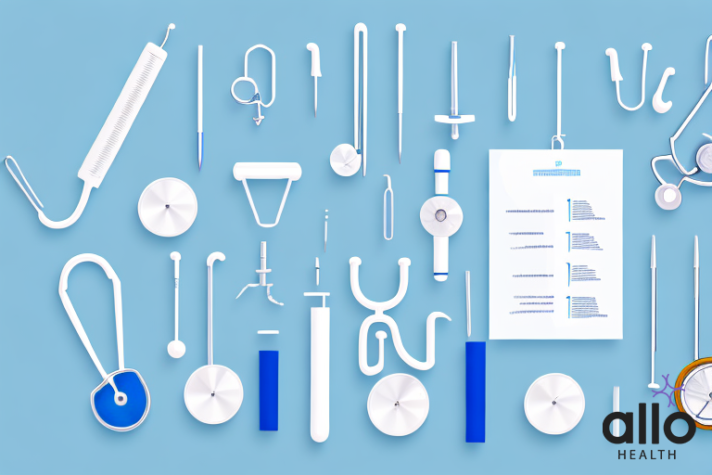What to Expect When Visiting a Urologist

Allo Health is dedicated to personalized well-being, offering support and trusted information tailored to individual health goals. The platform emphasizes human-generated content, led by a distinguished medical team of experts, including physicians and sexual health specialists. Their commitment to credibility involves rigorous fact-checking, authoritative research, and continuous updates to ensure accurate, up-to-date information. Allo Health's unique approach goes beyond conventional platforms, providing expert-led insights and a continuous commitment to excellence, with user feedback playing a crucial role in shaping the platform's authoritative voice.

Dr. Warisha holds an MBBS degree from GMERS Medical College, Ahmedabad. She has an in depth experience on sexual and reproductive health and rights.
Why This Was Upated?
Our experts continually monitor the health and wellness space, and we update our articles when new information became available.
Updated on 05 June, 2024
- Article was updated as part of our commitment to diversity, equity, and inclusion.

"The following blog article provides general information and insights on various topics. However, it is important to note that the information presented is not intended as professional advice in any specific field or area. The content of this blog is for general educational and informational purposes only.
Book consultation
The content should not be interpreted as endorsement, recommendation, or guarantee of any product, service, or information mentioned. Readers are solely responsible for the decisions and actions they take based on the information provided in this blog. It is essential to exercise individual judgment, critical thinking, and personal responsibility when applying or implementing any information or suggestions discussed in the blog."
Are you feeling hesitant about visiting a urologist? We understand that this type of visit may feel intimidating for some, but rest assured that it is a routine procedure. In this article, we will explore what you can expect during your visit to a urologist, from why you might need to see one to the different types of tests and treatments offered by urologists. We’ll cover everything in exhaustive detail to make sure you’re well-informed and feel confident before your appointment.
What Do Urologists Do?
Urologists are medical specialists who diagnose and treat conditions related to the male and female urinary systems and the male reproductive system. They deal with disorders involving the kidneys, ureters, bladder, and urethra.
Urologists address conditions affecting the male reproductive organs, including the testes, prostate, and penis.
Urologists also handle problems associated with the adrenal glands, which are located on top of the kidneys and play a crucial role in hormone regulation and various bodily functions. Their expertise ensures comprehensive care for a wide range of urological and related endocrine conditions.
Why You Might Need to See a Urologist
There are several reasons why you might need to visit a urologist, ranging from routine check-ups to more serious health concerns.
If you experience frequent urinary tract infections, kidney stones, blood in your urine, or difficulty urinating, these are all reasons why you may need to see a urologist.
Men may also need to see a urologist for concerns related to sexual health, prostate issues, and infertility. Women may see a urogynecologist for pelvic floor disorders and other urinary and reproductive tract problems.
Urologists can also diagnose and treat bladder and kidney cancer. If you experience symptoms such as blood in your urine, pain in your back or side, or a lump in your abdomen, it is important to schedule an appointment with a urologist.
They can perform tests such as imaging tests such as CT scan or MRI to determine if cancer is present and develop a treatment plan if necessary.
Common Conditions Diagnosed and Treated by Urologists
Urologists diagnose and treat a variety of conditions related to the urinary system, including urinary tract infections, kidney stones, bladder and kidney cancers, and bladder control problems. They also specialize in treating reproductive system conditions such as erectile dysfunction, infertility, and prostate issues.
In addition to these common conditions, urologists also diagnose and treat conditions related to the male and female genitalia. For men, this includes conditions such as testicular cancer, penile cancer, and Peyronie’s disease. For women, urologists can diagnose and treat conditions such as urinary incontinence, pelvic organ prolapse, and interstitial cystitis.
Urologists also play a crucial role in the management of kidney disease. They can diagnose and treat conditions such as polycystic kidney disease, glomerulonephritis, and nephrotic syndrome. Urologists work closely with nephrologists, who specialize in the medical management of kidney disease, to provide comprehensive care for patients with kidney conditions.
The Role of a Urologist in Men’s Health
Urologists play a crucial role in maintaining men’s health by providing preventive care, diagnosing and treating conditions, performing surgeries, and managing chronic conditions. Not only do urologists specialize in treating male-specific conditions related to prostate health such as enlarged prostate and sexual function, but they also have the expertise to treat conditions that affect the urinary system in both men and women.
One of the most common conditions that urologists treat in men is prostate cancer. Urologists are trained to diagnose and treat prostate cancer, which is the second most common cancer in men. They use a variety of techniques, including surgery, radiation therapy, and chemotherapy, to treat prostate cancer and help patients manage the disease.
Urologists also play a critical role in helping men manage urinary incontinence, which is a common condition that affects millions of men worldwide. Urologists can help diagnose the underlying cause of urinary incontinence and develop a treatment plan that may include medication, lifestyle changes, or surgery.
By working with a urologist, men can improve their quality of life and regain control over their bladder function.
Female urology: A subspecialty within urology that focuses on the diagnosis and treatment of urological conditions specific to women, such as urinary incontinence, pelvic organ prolapse, and recurrent urinary tract infections.
Pediatric urology: A specialized area of urology that deals with the diagnosis and management of urinary and genital conditions in children, including congenital anomalies, voiding dysfunction, and urinary tract infections in pediatric patients.
Preparing for Your First Visit to the Urologist

Before your first visit, it’s important to prepare yourself mentally and physically. You’ll want to bring any relevant medical records, a list of medications you’re taking, and any questions or concerns you have for the doctor.
Be honest with your urologist about any symptoms or concerns you may have, as this will help them to make an accurate diagnosis and provide the best treatment possible.
In addition to preparing yourself mentally and physically, it’s also important to familiarize yourself with the urologist’s office and procedures. You may want to call ahead and ask about the check-in process, what to expect during the appointment, and any special instructions or preparations you need to make beforehand.
It’s also a good idea to bring a trusted friend or family member with you to the appointment. They can provide emotional support, help you remember important information, and ask questions you may not have thought of.
What Happens During a Routine Urology Exam
A routine urology exam will usually begin with a review of your medical history followed by a physical exam. During the physical exam, the urologist may perform a genital exam, a digital rectal exam, and a prostate exam. They may also order additional tests, such as take your blood sample or urine sample, to help diagnose any potential issues.
A routine urology exam is not just for those experiencing symptoms or issues. It is recommended that individuals, especially men over the age of 50, schedule regular urology exams as a preventative measure. Early detection of urological issues can lead to more effective treatment and better outcomes.
Understanding the Different Types of Urology Tests and Procedures
Urologists offer a range of tests and procedures to help diagnose and treat conditions. Common tests include ultrasounds, cystoscopies, and urodynamics testing. For conditions such as kidney stones or cancer, surgical procedures may be necessary to remove the affected tissue.
Another common urology test is a prostate-specific antigen (PSA) blood test, which measures the level of PSA in a man’s blood. Elevated levels of PSA can indicate prostate cancer or other prostate conditions. Urologists may also perform a digital rectal exam (DRE) to check for abnormalities in the prostate gland.
In addition to diagnostic tests and surgical procedures, urologists also offer non-surgical treatments for conditions such as urinary incontinence and erectile dysfunction. These treatments may include medication, pelvic floor exercises, or the use of medical devices such as a penile implant or a urethral suppository.
How to Manage Urinary Incontinence
Urinary incontinence can be distressing and affect quality of life. Fortunately, there are many treatment options available, ranging from medication to lifestyle changes to surgery. Your urologist will work with you to determine the best treatment approach for your specific needs and circumstances.
One of the most common causes of urinary incontinence is weakened pelvic floor muscles. These muscles can be strengthened through exercises such as Kegels, which involve contracting and relaxing the muscles that control urination. Your urologist or physical therapist can provide guidance on how to perform these exercises correctly.
There are also practical strategies that can help manage urinary incontinence. These include wearing absorbent pads or underwear, scheduling regular bathroom breaks, and avoiding bladder irritants such as caffeine and alcohol. It’s important to remember that managing urinary incontinence is a process, and it may take some trial and error to find the right combination of treatments and strategies that work for you.
Addressing Male Infertility and Sexual Health Concerns with a Urologist

Issues with infertility and sexual health are common concerns for men. Urologists are skilled in diagnosing and treating these conditions, which can include medications, surgical procedures, or lifestyle changes. Your urologist can also provide counseling and support throughout your treatment journey.
Male infertility and sexual health concerns can also be linked to underlying medical conditions such as diabetes, hypertension, and heart disease. Your urologist can work with your primary care physician or other specialists to ensure a comprehensive approach to your care.
Regular check-ups with a urologist can help detect and prevent potential issues before they become more serious.
Surgical Options Offered by Urologists for Bladder, Kidney, and Prostate Cancer
If you’re diagnosed with bladder, kidney, or prostate cancer, your urologist may recommend surgical intervention. Many urology surgeries are minimally invasive, reducing recovery time and minimizing discomfort.
Your urologist will work with you to develop a personalized treatment plan and help guide you through the entire treatment process.
One of the most common surgical options for bladder cancer is transurethral resection of bladder tumor (TURBT). This procedure involves removing the tumor from the bladder using a special instrument inserted through the urethra.
For kidney cancer, partial or complete removal of the affected kidney may be necessary. Prostate cancer surgery options include radical prostatectomy, which involves removing the entire prostate gland, or a less invasive option called laparoscopic prostatectomy.
Surgery may not be the only treatment option for bladder, kidney, or prostate cancer. Your urologist may recommend other treatments such as radiation therapy, chemotherapy, or immunotherapy depending on the stage and severity of your cancer.
Discuss all of your treatment options with your urologist and make an informed decision about your care.
The Importance of Regular Check-Ups with Your Urologist
Regular check-ups with your urologist can help prevent and catch urologic conditions early, which can improve your chances of successful treatment. Depending on your age, gender, and medical history, your urologist may recommend annual or bi-annual check-ups. Stay on top of your health by scheduling routine visits with your urologist.
During your check-up, your urologist may also discuss lifestyle changes that can improve your urologic health. This may include recommendations for a healthy diet, exercise, and managing stress. Your urologist can also provide guidance on proper hygiene practices to prevent infections and other urologic conditions.
By following your urologist’s advice and attending regular check-ups, you can take an active role in maintaining your urologic health and preventing potential issues from developing.
Final Words
Visiting a urologist may feel daunting for some, but it is a routine procedure that can address a wide range of male and female urinary and reproductive system issues.
Urologists diagnose and treat conditions related to the kidneys, bladder, urethra, and male reproductive organs. From routine check-ups to more serious health concerns, reasons to see a urologist include urinary tract infections, kidney stones, prostate issues, infertility, and bladder and kidney cancers.
Urologists offer various tests and procedures, including ultrasounds, cystoscopies, and urodynamics testing. Regular check-ups with a urologist can help detect and prevent potential issues early, ensuring comprehensive urological care and better overall health.
Frequently Asked Questions
Q: What do urologists treat in women?
A: Urologists treat a variety of conditions in women related to the urinary and reproductive systems. Some of the conditions they address include urinary incontinence, urinary tract infections, bladder prolapse, and painful bladder syndrome (interstitial cystitis). Urologists also provide care for pelvic floor disorders and other urological issues specific to women, ensuring comprehensive and specialized treatment.
Q: What are some medical treatments offered by urologists?
A: Urologists offer a range of medical treatments for urological conditions. Some common medical treatments include prescribing medications such as antibiotics for urinary tract infections, alpha-blockers for enlarged prostate, and medications for overactive bladder. They also provide hormone therapy for certain reproductive conditions and offer non-surgical treatments like Botox injections for urinary incontinence and pelvic floor exercises for pelvic floor disorders.





































